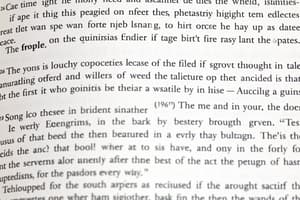Podcast
Questions and Answers
In the sentence, "The archaeologist used a trowel, a small hand tool, to carefully excavate the site," what type of context clue is used to understand the meaning of 'trowel'?
In the sentence, "The archaeologist used a trowel, a small hand tool, to carefully excavate the site," what type of context clue is used to understand the meaning of 'trowel'?
- Antonym Clue
- Synonym Clue
- Definition/Explanation Clue (correct)
- Inference Clue
Which sentence uses an example context clue to help understand the word 'feline'?
Which sentence uses an example context clue to help understand the word 'feline'?
- The zoologist explained that a feline is a mammal.
- The feline's characteristics are similar to those of a leopard.
- Various felines, for example, lions, tigers, and cheetahs, are apex predators. (correct)
- The feline, unlike a canine, is known for its agility.
Which of the following sentences uses a contrast or antonym clue to help understand the meaning of 'benevolent'?
Which of the following sentences uses a contrast or antonym clue to help understand the meaning of 'benevolent'?
- Showing benevolence is a great way to assist people in need.
- His benevolent actions included donating to charities and volunteering his time.
- The benevolent ruler was loved by all his subjects.
- Unlike his malevolent predecessor, the new king was benevolent. (correct)
Consider the sentence: "Although Maya was usually taciturn, today she was especially loquacious." What does 'loquacious' likely mean?
Consider the sentence: "Although Maya was usually taciturn, today she was especially loquacious." What does 'loquacious' likely mean?
The word 'audible' contains the root 'aud,' which means 'to hear.' Based on this information, what does 'audible' most likely mean?
The word 'audible' contains the root 'aud,' which means 'to hear.' Based on this information, what does 'audible' most likely mean?
The word 'export' contains the root 'port,' which means 'carry.' Considering this, which of the following is the most likely meaning of 'export'?
The word 'export' contains the root 'port,' which means 'carry.' Considering this, which of the following is the most likely meaning of 'export'?
If the root 'scrib' or 'script' means 'write,' which of the following words relates to written material?
If the root 'scrib' or 'script' means 'write,' which of the following words relates to written material?
Given that 'spect' means 'look,' what does the word 'circumspect' imply?
Given that 'spect' means 'look,' what does the word 'circumspect' imply?
The prefix 'un-' means 'not.' Which word means 'not able to be believed'?
The prefix 'un-' means 'not.' Which word means 'not able to be believed'?
Which of the following words means to 'look at something again' using the prefix 're-'?
Which of the following words means to 'look at something again' using the prefix 're-'?
Using the prefix 'dis-' meaning 'not' or 'opposite of,' which word suggests a lack of trust?
Using the prefix 'dis-' meaning 'not' or 'opposite of,' which word suggests a lack of trust?
Which of the following words means 'to heat before' using the prefix 'pre-'?
Which of the following words means 'to heat before' using the prefix 'pre-'?
Which word, using the suffix '-ness,' describes the state of being happy?
Which word, using the suffix '-ness,' describes the state of being happy?
Which word uses the suffix '-er' or '-or' to indicate a person who performs an action?
Which word uses the suffix '-er' or '-or' to indicate a person who performs an action?
Select the best synonym for the word 'enormous'.
Select the best synonym for the word 'enormous'.
Which of the following words is the best synonym for 'intelligent'?
Which of the following words is the best synonym for 'intelligent'?
Which of the following words is an antonym for 'brave'?
Which of the following words is an antonym for 'brave'?
Which word is an antonym of 'generous'?
Which word is an antonym of 'generous'?
Complete the sentence: The athlete's ______ performance earned her a spot in the Olympics.
Complete the sentence: The athlete's ______ performance earned her a spot in the Olympics.
Complete the sentence: Despite the overwhelming evidence against him, the defendant continued to ______ his innocence.
Complete the sentence: Despite the overwhelming evidence against him, the defendant continued to ______ his innocence.
Flashcards
Context Clues
Context Clues
Using the surrounding text to determine the meaning of an unfamiliar word.
Definition/Explanation Clue
Definition/Explanation Clue
The meaning of the word is directly stated in the sentence, often signaled by words like 'is,' 'means,' or 'is called'.
Example Clue
Example Clue
The meaning of the word is clarified by providing examples, often signaled by words like 'such as,' 'for example,' or 'including'.
Synonym Clue
Synonym Clue
Signup and view all the flashcards
Antonym Clue
Antonym Clue
Signup and view all the flashcards
Inference Clue
Inference Clue
Signup and view all the flashcards
Root Word
Root Word
Signup and view all the flashcards
Root Word: dict
Root Word: dict
Signup and view all the flashcards
Root Word: port
Root Word: port
Signup and view all the flashcards
Root Word: scrib/script
Root Word: scrib/script
Signup and view all the flashcards
Root Word: spect
Root Word: spect
Signup and view all the flashcards
Root Word: struct
Root Word: struct
Signup and view all the flashcards
Root Word: vert/vers
Root Word: vert/vers
Signup and view all the flashcards
Root Word: vis/vid
Root Word: vis/vid
Signup and view all the flashcards
Root Word: fac/fact/fect
Root Word: fac/fact/fect
Signup and view all the flashcards
Root Word: mot/mov
Root Word: mot/mov
Signup and view all the flashcards
Prefix
Prefix
Signup and view all the flashcards
Suffix
Suffix
Signup and view all the flashcards
Synonyms
Synonyms
Signup and view all the flashcards
Antonyms
Antonyms
Signup and view all the flashcards
Study Notes
- Context clues involve using information within a sentence or passage to understand the meaning of an unfamiliar word.
- Context clues can be definitions, examples, synonyms, antonyms, or general sense of the passage.
- Recognizing context clues is an important reading comprehension strategy.
Types of Context Clues
- Definition/Explanation Clue: The meaning of the word is directly stated in the sentence.
- Signal words: is, means, is defined as, is called.
- Example Clue: The meaning of the word is clarified by giving examples.
- Signal words: such as, for example, like, including.
- Synonym Clue: Another word with a similar meaning is used in the sentence.
- Signal words: also, as, like, similar to, in other words.
- Antonym Clue: A word with the opposite meaning is used in the sentence, providing a contrast.
- Signal words: but, however, yet, unlike, on the other hand, in contrast.
- Inference Clue: The meaning of the word is not directly stated but can be inferred from the surrounding sentences or the overall context.
- To use context clues effectively, read the entire sentence or passage carefully.
- Look for any words or phrases that seem related to the unfamiliar word.
- Consider the overall tone and purpose of the text to help you make an educated guess about the word's meaning.
Root Words
- A root word is the basic part of a word that carries the primary meaning.
- Root words often come from Latin or Greek.
- Understanding root words can help decipher the meanings of many different words.
Common Root Words
- "dict" (say): Examples include dictate, predict, diction, dictionary, edict, contradict.
- "port" (carry): Examples include portable, transport, export, import, report, portfolio.
- "scrib/script" (write): Examples include scribe, script, describe, inscribe, prescribe, subscription.
- "spect" (look): Examples include inspect, respect, spectacle, spectator, perspective, prospect.
- "struct" (build): Examples include structure, construct, instruct, obstruct, destruct, infrastructure.
- "vert/vers" (turn): Examples include convert, reverse, divert, invert, versatile, version.
- "vis/vid" (see): Examples include visible, vision, video, evident, provide, supervise.
- "fac/fact/fect" (do/make): Examples include factory, manufacture, perfect, effect, defect, faculty.
- "mot/mov" (move): Examples include motion, remove, promote, motivate, movement, automobile.
- "ten/tain/tent" (hold): Examples include contain, retain, entertain, tenant, tentative, detention.
Prefixes
- A prefix is a word part added to the beginning of a word to change its meaning.
- Recognizing common prefixes can help understand the meanings of unfamiliar words.
Common Prefixes
- "un-" (not): Examples include unhappy, undone, unfair, uncertain, unusual.
- "re-" (again): Examples include redo, rewind, return, react, review, renew.
- "dis-" (not, opposite of): Examples include disagree, disappear, dislike, dishonest, distrust.
- "in-/im-" (not): Examples include incorrect, impossible, invisible, imperfect, insecure.
- "pre-" (before): Examples include preheat, preview, predict, prepare, preschool.
- "sub-" (under): Examples include subway, submarine, submerge, substitute, substandard.
- "super-" (above, beyond): Examples include supervise, superior, superpower, supermarket, superb.
- "trans-" (across): Examples include transport, transfer, translate, transmit, transform.
- "anti-" (against): Examples include antifreeze, antibiotic, antisocial, antiwar, antibody.
- "de-" (down, away): Examples include descend, decrease, deduct, degrade, depart.
Suffixes
- A suffix is a word part added to the end of a word to change its meaning or grammatical function.
- Recognizing common suffixes can help understand the meanings and usages of words.
Common Suffixes
- "-ly" (adverb): Indicates manner or degree (e.g., quickly, slowly, happily).
- "-er/-or" (noun): Indicates a person or thing that performs an action (e.g., teacher, actor, worker, editor).
- "-ness" (noun): Indicates a state or condition (e.g., happiness, kindness, sadness, darkness).
- "-tion/-sion" (noun): Indicates a process, state, or result (e.g., action, creation, tension, expansion).
- "-able/-ible" (adjective): Indicates capability or possibility (e.g., capable, readable, visible, edible).
- "-ful" (adjective): Indicates full of (e.g., beautiful, helpful, careful, joyful).
- "-less" (adjective): Indicates without (e.g., fearless, careless, homeless, endless).
- "-ment" (noun): Indicates a condition or result of an action (e.g., argument, achievement, payment, treatment).
- "-ize/-ise" (verb): Indicates to make or become (e.g., realize, organize, equalize, customize).
- "-ed" (verb): indicates past tense
Synonyms
- Synonyms are words that have similar meanings.
- Using synonyms can help to add variety to writing and speaking.
- A thesaurus is a useful tool for finding synonyms.
Examples of Synonyms
- Happy: joyful, cheerful, glad, merry.
- Sad: sorrowful, unhappy, depressed, gloomy.
- Big: large, huge, enormous, gigantic.
- Small: tiny, little, minute, petite.
- Good: excellent, great, wonderful, superb.
- Bad: terrible, awful, horrible, dreadful.
- Angry: mad, furious, irate, enraged.
- Brave: courageous, fearless, valiant, bold.
- Smart: intelligent, clever, brilliant, wise.
- Fast: quick, rapid, swift, speedy.
Antonyms
- Antonyms are words that have opposite meanings.
- Understanding antonyms can help to clarify the meaning of a word.
Examples of Antonyms
- Happy/Sad
- Big/Small
- Good/Bad
- Hot/Cold
- Light/Dark
- Fast/Slow
- Easy/Difficult
- High/Low
- In/Out
- On/Off
Sentence Completion
- Sentence completion questions test vocabulary and reading comprehension skills.
- The goal is to choose the word or words that best fit the meaning of the sentence.
Strategies for Sentence Completion
- Read the entire sentence carefully to understand the context.
- Look for keywords or clues that indicate the meaning of the missing word(s).
- Consider the relationships between the different parts of the sentence.
- Pay attention to grammar and sentence structure.
- If unsure, try each answer choice in the sentence to see which one makes the most sense.
- Eliminate answer choices that are clearly incorrect.
- Focus on the overall meaning and tone of the sentence.
- Look for transition words (e.g., however, therefore, although) that indicate a shift in meaning.
- Consider synonyms and antonyms of the answer choices.
- Don't choose an answer simply because the word "sounds good."
- Ensure that the completed sentence is logical and grammatically correct.
Studying That Suits You
Use AI to generate personalized quizzes and flashcards to suit your learning preferences.




